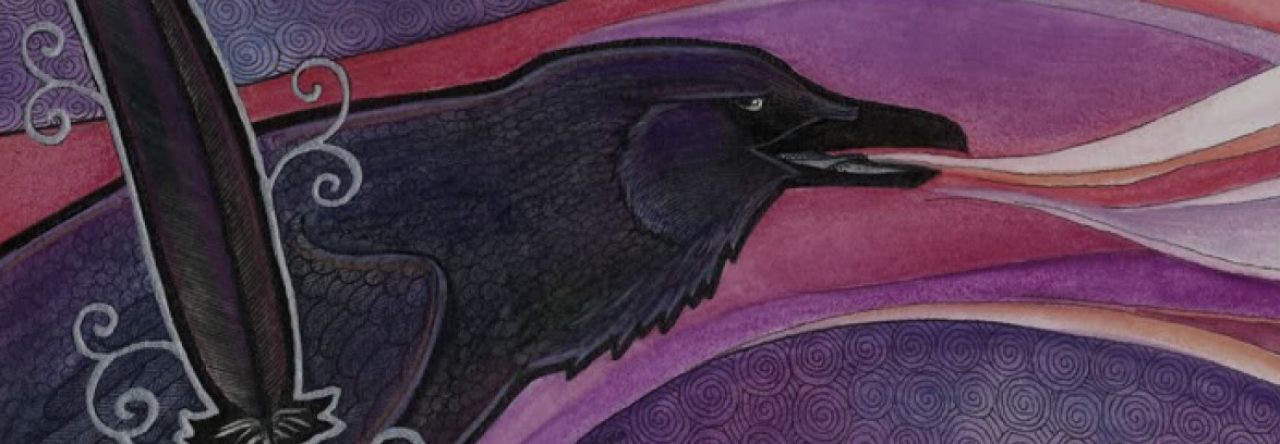
Yesterday I made a somewhat wobbly appearance at Swancon, as evidenced by my badge (with similarly wobbly name written by me!).
Things of awesome in this photo: shiny Ditmar pin! I count my chance of winning a Ditmar as being slim, but I am so damn chuffed to be nominated (technically twice, since I was part of the Snapshot team which also garnered a nomination this year). And the cute little chicken, which I got as a bonus for funding Defying Doomsday (link goes to the Pozible campaign, which you should totally fund if you haven’t.).
I also sat on a panel on the writing of good short stories. During which I recommended a bunch of authors, so I figured that I might make some notes here, in case someone wants to chase up the authors that I spoke about. Helen Stubbs also posted about the panel briefly here and tweeted some really useful pieces of advice (and posted a photo in which I manage to look utterly bored, heh).
One of the things we talked about was the need to read a lot of good short stories to get a good idea of what makes a good short story. Juliet Marillier recommended the work of Thoraiya Dyer and Robert G. Cook in particular, and I recommended Juliet’s “By Bone Light”, as well as work by Angela Slatter (whom I think we all pretty much mentioned at one point or other as being one of the outstanding writers of short fiction in Australia), Lisa L.Hannett, Kirstyn McDermott, Stephen Dedman (who was on the panel with us, and is a massive font of useful knowledge about writing in general) and Martin Livings. Shirley Jackson and Angela Carter also got a mention. I wish also that I could go back in time and add Helen Marshall and Kelly Link to the list, but we did mainly try and constrain ourselves to Australian authors.
I also may have confessed to hating short stories at one point in my life. Which is true, and, thinking more on it, I blame it mostly on the kinds of short stories we had to read in high school. I got truly lucky and got to read some amazing poems and novels during my school years, but the short stories left me cold. It was starting to read some of the amazing short story writers publishing in Australia that really got me into the genre.
We also made much mention of how lucky we are to have some amazing small presses in Australia helping to publish short fiction. I talked up Twelfth Planet’s Twelve Planets a lot (I’m sorry, I cannot help how much I love with them I am!), and we also mentioned Fablecroft and Ticonderoga (in particular the Australian Years Best that have been coming out from them).
And some other general pieces of advice, as I remember them:
- Read good short stories. You cannot learn how to write short stories from reading novels, and you cannot compact a novel into a short story length.
- The beginning and end of a short story are the crucial points. The beginning must hook a reader – whether with an actual catchy hook, some beautiful imagery or gorgeous writing (or all three). Vague meandering at the beginning will make many readers put down the story – we need something to care about or be interested in. And likewise, a strong ending will linger in the mind long after the story has been finished. Stephen Dedman described a story as being a bridge, with the beginning and end anchoring everything.
- You need to take out everything that does not serve the story. You’re constrained by word length, and things cannot take up space without needing to be there. However, Juliet Marillier warned that you shouldn’t go too far and take out all of your beautiful prose and kill the voice of the piece.
- I talked briefly (and probably too vaguely) about resonance. One of the things that gets me about a truly good story is resonance – having a deeper meaning or layered connections. Tangentially, we also talked about a good story feeling like a gut punch (I believe these words were Stephen Dedman’s, and I agree with them wholeheartedly).
- You need to know the basic rules of writing before you can break them. And short stories are a great place to break them and experiment. I have problems writing longer pieces in anything but a linear fashion, but in short stories I really like fragmenting time lines. You can write stories in any fashion you like – linearly, backwards, inside out. Learn the rules, and then have fun.
I’d like to thank everyone quickly who came to the panel yesterday, and all of my fellow panel members. I really loved being on it, and I hope that it was useful for the people who attended.
